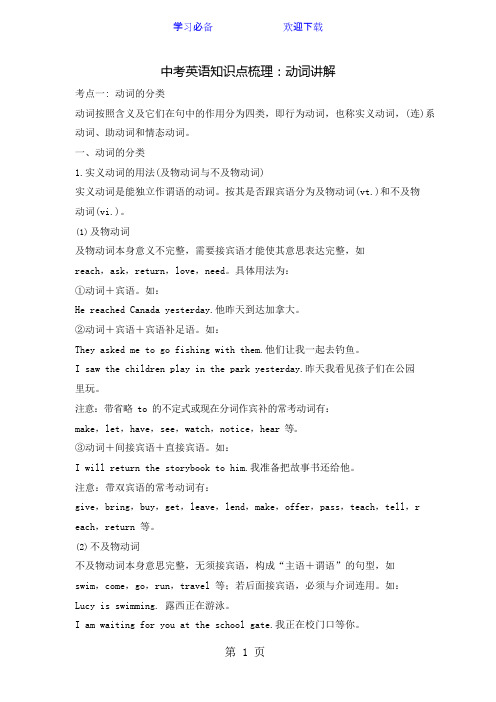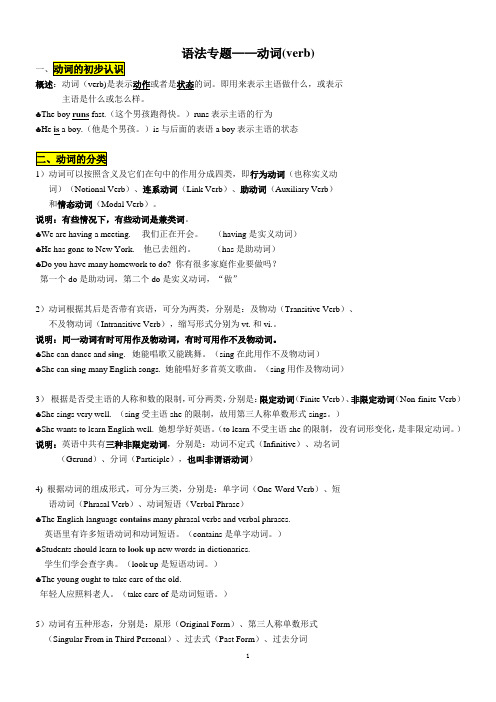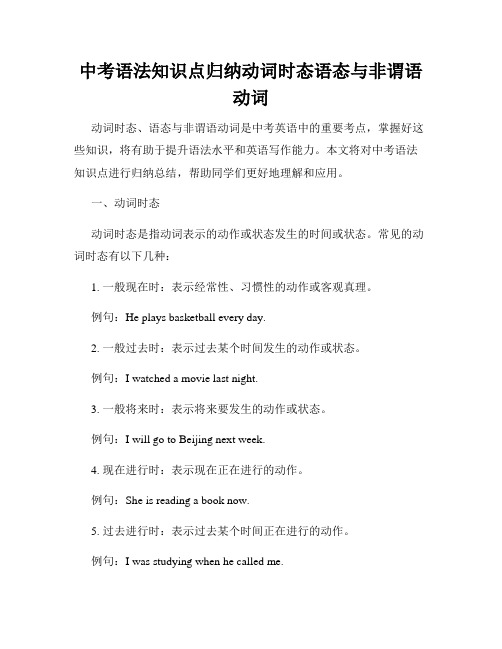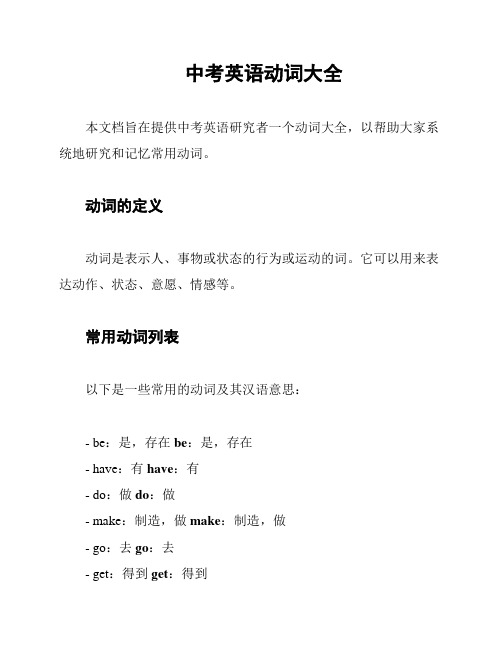2014中考英语语法知识点总结:动词
(语法复习参考)2014中考英语_非谓语动词课件(考点大观+名师精讲+经典真题+感悟中考)

表语
功能
例句 I want to be an actor. 我想成为一名演员。
说明 只能作某些动词的宾语, 一般不作介词的宾语
宾语
宾语 补足 语 定语
She asked me to speak 在make,let,see, English. hear,watch等使役动 词后,不定式省略to 她要求我说英语。 Do you have anything to say? 你有要说的吗? I come here to see you. 我来这里是为了见你。 不定式作定语,要放在 所修饰词的后面 不定式作状语,其逻辑 主语要和句子的主语一 致
提供请求负担起(offer, beg, demand, afford),
答应安排理应当(promise, arrange, be supposed),
以上后跟不定式,劝君牢记永不忘。
考点二
动名词
动名词相当于名词、形容词。可作主语、宾语、表语和定语。
功能 主语
例句
说明
Eating too much is bad for your health. 谓语动词用单数 吃太多对你的健康有害处。 I like playing basketball much. 我非常喜欢打篮球。 very 表示习惯性的动 作
宾语
Stamps are used for sending letters. 邮票是用来寄信的。
功能
例句
说明
表语
His hobby is collecting 多数情况下可转换为 stamps. 他的爱好是集邮。 动名词作主语 Bill is in the reading room. 比尔在阅览室里。 只表明它所修饰的词 的用途、所属关系等
初中英语动词的语法知识点归纳

初中英语动词的语法知识点归纳初中英语动词的语法知识点归纳动词的定义:动词是表示动作或状态的词,【中考英语】语法基础-6。
例如:work,工作 , study,学习,eat 吃。
动词的分类:动词有两种分类方法。
1)限定动词和非限定动词。
限定动词在句中作谓语,有人称和数的变化。
非限定动词有动词不定式,动名词和分词三种。
在句中不能单独作谓语,没有人称和数的变化。
2)实义动词,连系动词,情态动词和助动词。
实义动词有完整的词义,并能单独作谓语,实义动词又可分为及物动词和不及物动词。
例如:study 学习, reach 到达, see 看见, rise 升起。
连系动词在句中作谓语动词,后面跟表语。
连系动词有 be, seem, look, become, get, grow, feel, appear, remain, turn。
情态动词表示能力,义务,必要,猜测等说话人的语气或情态。
情态动词只能和动词原形一起构成谓语动词。
情态动词有can, will, have, be, should, do, would, 等。
助动词只能和主要动词一起构成各种时态,语态和语气等动词形式。
do, shall, will, have, has.动词的基本形式:英语动词有四种基本形式:动词原形,过去式,过去分词和现在分词。
这四种动词形式和助动词一起构成动词的时态,语态和语气。
动词的原形。
就是词典中所给的形式。
例如:be, have, buy, sit.动词过去式和过去分词的构成有规则的和不规则的两种形式。
规则动词的过去式和过去分词,由在原形动词的'后面加词尾 -ed 构成。
work - worked - worked不规则动词的过去式和过去分词的形式是不规则的,须要一一记忆。
go - went - gone do - did - done动词的现在分词由动词原形加 -ing 构成。
构成方法如下:1)一般情况在动词原形后加 -ing 。
(完整版)中考英语知识点梳理:动词讲解(可编辑修改word版)

中考英语知识点梳理:动词讲解考点一: 动词的分类动词按照含义及它们在句中的作用分为四类,即行为动词,也称实义动词,(连)系动词、助动词和情态动词。
一、动词的分类1.实义动词的用法(及物动词与不及物动词)实义动词是能独立作谓语的动词。
按其是否跟宾语分为及物动词(vt.)和不及物动词(vi.)。
(1)及物动词及物动词本身意义不完整,需要接宾语才能使其意思表达完整,如reach,ask,return,love,need。
具体用法为:①动词+宾语。
如:He reached Canada yesterday.他昨天到达加拿大。
②动词+宾语+宾语补足语。
如:They asked me to go fishing with them.他们让我一起去钓鱼。
I saw the children play in the park yesterday.昨天我看见孩子们在公园里玩。
注意:带省略 to 的不定式或现在分词作宾补的常考动词有:make,let,have,see,watch,notice,hear 等。
③动词+间接宾语+直接宾语。
如:I will return the storybook to him.我准备把故事书还给他。
注意:带双宾语的常考动词有:give,bring,buy,get,leave,lend,make,offer,pass,teach,tell,r each,return 等。
(2)不及物动词不及物动词本身意思完整,无须接宾语,构成“主语+谓语”的句型,如swim,come,go,run,travel 等;若后面接宾语,必须与介词连用。
如:Lucy is swimming. 露西正在游泳。
I am waiting for you at the school gate.我正在校门口等你。
(3)有些动词既可作及物动词,又可作不及物动词。
如:We study English.我们学习英语。
(及物)We study hard.我们学习努力。
[全]中考初中英语全考点:动词
![[全]中考初中英语全考点:动词](https://img.taocdn.com/s3/m/a1505b37b80d6c85ec3a87c24028915f804d8416.png)
中考初中英语全考点:动词动词是用来描述动作、行为或状态的词。
动词在句子中作谓语,是句子不可缺少的部分,用来说明主语是什么、处于什么状态或做什么。
动词的分类根据不同的分类方式,动词可分为不同的类型。
根据动词的句法功能可以将动词分为实义动词(或称行为动词)、连系动词、助动词和情态动词。
拓展 动词按其在句中能否作谓语或帮助构成谓语,又可分为谓语动词和非谓语动词两大类。
1实义动词实义动词是指具有完整意义,可以单独作谓语的动词,主要表示主语的动作、状态和品质。
实义动词也可与助动词或情态动词相结合表示更加复杂的动词意义。
(1)及物动词和不及物动词①及物动词可以直接跟宾语的动词称为及物动词。
英语中的动词大多数都是及物动词。
及物动词可分为跟单宾语的及物动词、跟双宾语的及物动词和跟复合宾语的及物动词等。
a. 跟单宾语的及物动词I finished my model car.我完成了我的小汽车模型。
拓展常见的跟单宾语的及物动词:love喜爱finish完成thank感谢cover覆盖discover发现enjoy喜欢forget忘记guess猜测please使高兴put放worry使烦恼excite使激动surprise使惊讶interest使感兴趣b. 跟双宾语的及物动词可以同时跟两个宾语的及物动词叫双宾语及物动词。
双宾语中一个宾语指人,称为间接宾语;一个宾语指物,称为直接宾语。
通常间接宾语在前,直接宾语在后。
有时,间接宾语可以放在直接宾语后面,但是需要加上介词to/for。
Peter gave me some books yesterday.间接宾语直接宾语昨天彼得给了我一些书。
A friend lent some money to me.直接宾语间接宾语一个朋友借给了我一些钱。
Karen bought a dictionary for me as a birthday gift.直接宾语间接宾语卡伦给我买了一本词典作为生日礼物。
中考动词知识点归纳总结

中考动词知识点归纳总结动词是表示一个人或物体的动作、状态或特征的一种词类。
在语言学中,动词是非常重要的一种词类,在句子中起着至关重要的作用。
动词有时态、语态、情态和语气等不同的形式。
掌握动词的知识,对于学生来说是非常重要的,下面我来总结一下中考中涉及的动词知识点。
一、动词的基本概念1. 动词的定义动词是表示一个人或物体的动作、状态或特征的一种词类。
2. 动词的构成动词可以由一个词构成,也可以由两个或多个词组成,比如动词短语和动词复合结构。
3. 动词的分类动词可以根据词义的不同分为行为动词和状态动词。
4. 动词的时态动词根据动作发生的时间不同,在句子中用适当的时态形式表示。
英语中一般有一般现在时、一般过去时、一般将来时和过去将来时等时态。
5. 动词的语态动词可以根据动作的执行者不同分为主动语态和被动语态。
6. 动词的情态有些动词有自己的特殊形式,称为情态动词。
情态动词包括can, could, may, might, must, shall, should, will, would等。
7. 动词的语气动词根据说话者的语气可以分为陈述语气、疑问语气、祈使语气等。
二、动词的用法1. 动词的主谓一致动词要和其主语在数和人称上保持一致。
2. 动词的时态使用根据句子的语境选择适当的时态。
3. 动词的语态转换主动语态和被动语态的转换。
4. 动词的情态使用根据句子的需要选择适当的情态动词。
5. 动词的非谓语形式使用动词的不定式、动名词和分词等的使用。
6. 动词的时态与语态的综合使用在实际应用中,时态和语态是相辅相成的。
7. 动词的虚拟语气使用虚拟语气是用来表示一种虚构的情况或假设的语气。
三、动词的习惯搭配1. 动词搭配名词、形容词和介词的用法。
2. 动词的固定搭配有些动词与介词、名词或者形容词搭配在一起,形成固定的表达习惯。
以上就是关于中考动词知识点的归纳总结,希望对你有所帮助。
学生在备考中考时,要认真掌握动词的知识点,多做题,多总结,一定会有所收获。
中考英语总复习语法专题之动词(verb)知识点清单

语法专题——动词(verb)概述:动词(verb)是表示动作或者是状态的词。
即用来表示主语做什么,或表示1)动词可以按照含义及它们在句中的作用分成四类,即行为动词(也称实义动词)(Notional Verb)、连系动词(Link Verb)、助动词(Auxiliary Verb)和情态动词(Modal Verb)。
说明:有些情况下,有些动词是兼类词。
♣We are having a meeting.我们正在开会。
(having是实义动词)♣He has gone to New York.他已去纽约。
(has是助动词)♣Do you have many homework to do? 你有很多家庭作业要做吗?第一个do是助动词,第二个do是实义动词,“做”2)动词根据其后是否带有宾语,可分为两类,分别是:及物动(Transitive Verb)、不及物动词(Intransitive Verb),缩写形式分别为vt. 和vi.。
说明:同一动词有时可用作及物动词,有时可用作不及物动词。
♣She can dance and sing. 她能唱歌又能跳舞。
(sing在此用作不及物动词)♣She can sing many English songs. 她能唱好多首英文歌曲。
(sing用作及物动词)3)根据是否受主语的人称和数的限制,可分两类,分别是:限定动词(Finite Verb)、非限定动词(Non-finite Verb)♣She sings very well. (sing受主语she的限制,故用第三人称单数形式sings。
)♣She wants to learn English well. 她想学好英语。
(to learn不受主语she的限制,没有词形变化,是非限定动词。
)说明:英语中共有三种非限定动词,分别是:动词不定式(Infinitive)、动名词(Gerund)、分词(Participle),也叫非谓语动词)4) 根据动词的组成形式,可分为三类,分别是:单字词(One-Word Verb)、短语动词(Phrasal Verb)、动词短语(Verbal Phrase)♣The English language contains many phrasal verbs and verbal phrases.英语里有许多短语动词和动词短语。
中考语法知识点归纳动词时态语态与非谓语动词

中考语法知识点归纳动词时态语态与非谓语动词动词时态、语态与非谓语动词是中考英语中的重要考点,掌握好这些知识,将有助于提升语法水平和英语写作能力。
本文将对中考语法知识点进行归纳总结,帮助同学们更好地理解和应用。
一、动词时态动词时态是指动词表示的动作或状态发生的时间或状态。
常见的动词时态有以下几种:1. 一般现在时:表示经常性、习惯性的动作或客观真理。
例句:He plays basketball every day.2. 一般过去时:表示过去某个时间发生的动作或状态。
例句:I watched a movie last night.3. 一般将来时:表示将来要发生的动作或状态。
例句:I will go to Beijing next week.4. 现在进行时:表示现在正在进行的动作。
例句:She is reading a book now.5. 过去进行时:表示过去某个时间正在进行的动作。
例句:I was studying when he called me.6. 现在完成时:表示过去的动作对现在造成的影响或结果。
例句:She has visited Paris three times.7. 过去完成时:表示对过去某个时间之前发生的动作进行的描述。
例句:They had already left when I arrived.二、动词语态动词语态是指动作发出的主体和动作所受的影响关系。
英语中常见的动词语态有以下几种:1. 主动语态:表示主语是动作的发出者。
例句:He fixed the car yesterday.2. 被动语态:表示主语是动作的承受者。
例句:The car was fixed by him yesterday.3. 进行时态:表示主语正在进行的动作处于进行状态。
例句:The book is being read by her.4. 完成时态:表示主语已经完成的动作处于完成状态。
例句:The book has been read by her.注意:被动语态需要根据动作的时态来变换,同时需要适当更改时态动词。
中考英语动词大全

中考英语动词大全本文档旨在提供中考英语研究者一个动词大全,以帮助大家系统地研究和记忆常用动词。
动词的定义动词是表示人、事物或状态的行为或运动的词。
它可以用来表达动作、状态、意愿、情感等。
常用动词列表以下是一些常用的动词及其汉语意思:- be:是,存在be:是,存在- have:有have:有- do:做do:做- make:制造,做make:制造,做- go:去go:去- get:得到get:得到- say:说say:说- see:看见see:看见- take:拿,取take:拿,取- can:能够can:能够- will:将要will:将要- give:给予give:给予- find:找到find:找到- think:思考think:思考- know:知道know:知道- want:想要want:想要- need:需要need:需要- like:喜欢like:喜欢- love:爱love:爱- believe:相信believe:相信- say:说say:说- feel:感觉feel:感觉- work:工作work:工作- call:打电话call:打电话- try:尝试try:尝试- ask:问ask:问- use:使用use:使用- tell:告诉tell:告诉以上只是一部分常用动词的例子,你可以根据具体语境和需要进一步研究和掌握更多动词。
总结动词在英语研究中起着重要的作用,它们帮助我们表达动作、状态和情感。
通过系统地研究和练动词,我们能够提高自己的英语表达能力。
希望本文档对你的中考英语研究有所帮助!注意:本文档提供的动词仅供参考,可以根据自己的需要和研究进度进行扩展和调整。
- 1、下载文档前请自行甄别文档内容的完整性,平台不提供额外的编辑、内容补充、找答案等附加服务。
- 2、"仅部分预览"的文档,不可在线预览部分如存在完整性等问题,可反馈申请退款(可完整预览的文档不适用该条件!)。
- 3、如文档侵犯您的权益,请联系客服反馈,我们会尽快为您处理(人工客服工作时间:9:00-18:30)。
2014中考英语语法知识点总结:动词
一定要记牢动词的现在分词,过去式,过去分词。
比如:catch 的过去式和过去分词(caught,caught) 你可能就不知道吧?痛下决心,好好记一记吧。
先讲系动词。
系动词:大概是最简单的动词了。
你只需注意的是系动词除了be的形式之外,还有become,get,grow,turn,sound,look,smell,taste等,它们不能单独作谓语,必须和作表语的词语(如形容词, 名词等) 连用, 所以用的时候,可要小心为是呀!如:It smells delicious.(它闻起来味道很美)。
delicious 是形容词,不是副词。
情态动词:首先要记住情态动词后必跟动词原形。
must的意思是"应当,必须",侧重于说话者的主观看法,没有时态变化,其否定式是mustn't,在"Must I(we) ...."的疑问句中,须注意的是其否定回答常用needn't。
如:Must I go?(我一定要走吗?) No,you needn't.(不,不必。
)
need意为"需要"。
既可作实义动词,又可作情态动词,因此在用法上需要注意。
作实义动词时,need后跟名词,动名词,或不定式。
如:I need to go. (我得走了。
) 作情态动词时,后跟动词原形。
如:You needn't come tomorrow if you are busy. (如果你忙,明天就不必来了。
)
实意动词:我们跑(run),我们跳(jump),我们笑(laugh),这些都得用实意动词来表达。
我们一起来看一看一些特殊的词吧。
它们在接动名词和不定式时意义有所不同。
stop:这个词让好多同学大伤了一番脑筋,到底什么时候加to do,什么时候加
doing 呢?两者意义又有什么不同呢?OK, Come with me. 看下面两个句子。
When the teacher came in, they stopped to read.
When the teacher came in, they stopped talking.
第一句的意思是"当老师进来时,他们停下来开始读书"。
而第二句的意思是 "老师进来时,他们停止了说话"。
所以stop to do sth表示"停止正在做的事情去干另一件事"。
而stop doing表示"中断正在做的某事"。
forget,remember,regret 这三个词用法基本相同,只要记住+doing 表示"事情已经做过",+to do表示"事情还未做"就可以了。
感官动词:see,watch, notice,look at,hear,listen to,smell,taste,feel 等 +do 表示动作的完整性,真实性 +doing 表示动作的连续性,进行性。
如:I saw him work in the garden yesterday. 昨天我看见他在花园里干活了。
(强调"我看见了"这个事实) I saw him working in the garden yesterday.(强调"我见他正干活"这个动作)昨天我见他正在花园里干活。
